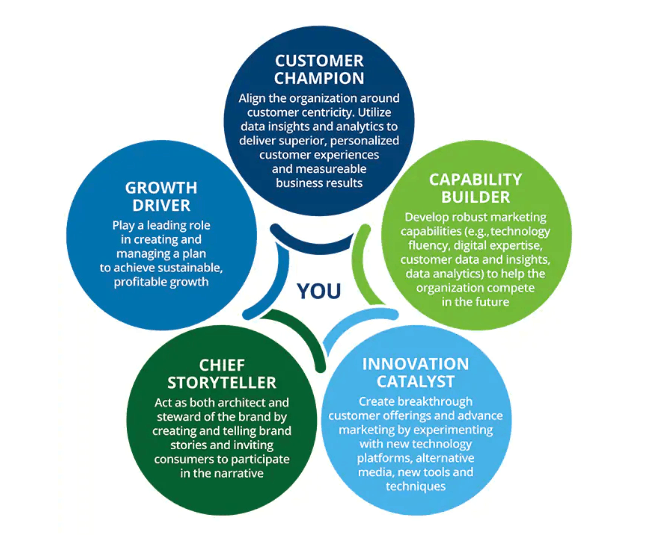A modern CMO needs a lot more than just marketing skills. In Chapter 4 of Mean People Suck, “Our Customers Know We Suck,” I explore the problem that many brands are facing these days: Consumers are becoming increasingly turned off by traditional marketing and are abandoning brands that don’t have a mission bigger than trying to sell their products.
To succeed in these challenging times, brands must forge a real and meaningful connection with their customers. A good product is no longer enough to achieve brand loyalty.
Quick Takeaways
- Traditional advertising is no longer as effective as it once was.
- The CMOs of today must refocus their marketing efforts on meeting the customers’ needs rather than on simple promotion.
- Empathy is a valuable skill to understand what customers want, and part of the responsibility of providing this falls on the marketing department.
Why Successful Marketing Is More Than Just Advertising
In recent years, we’ve seen a trend towards companies slashing their advertising budget. This is in response to the growing ineffectiveness of traditional advertising, as consumers have become desensitized and even distrustful of it.
Alongside the reduction in the effectiveness of advertising, consumers are more likely to do their own research about the products they buy. There is more information available online than ever before, and research has shown that the vast majority of buyer research takes place before the buyer contacts the vendor.
In other words, consumers are educating themselves, and they don’t want to be told over and over again how great a product is. Instead, they need helpful information so they can research and ultimately make their own decisions on which products are the best.
Coca-Cola made headlines a few years ago when they decided to ditch the role of CMO. When their Global Chief Marketing Officer Marcos de Quinto left the company, they decided not to reinstate the position.
Instead, they hired a “Chief Growth Officer” – a position that was filled not by a marketer but by a sales executive, Francisco Crespo, who took on global marketing as part of his role in the face of the “fast-changing needs of our consumers, customers, system and associates around the world.”
Why CMOs Are a Dying Breed
The idea behind eliminating the CMO role was not because the brand didn’t need marketing. Rather, they wanted to change their marketing approach from creative advertising for the sake of it towards business growth and satisfying customer needs better.
As Coca-Cola’s global vice president said at a press event, “Marketing in Coca-Cola is meant to drive business. The basic elements of awareness and winning awards at the Cannes Lions Festival no longer satisfies us… When you have the boss whose job title is growth officer then you have to come up with growth in terms of new consumers who love the brand more, are buying Coca-Cola more frequently and have a high appreciation for the brand value.”
Coca-Cola decided to move away from the previous CMO’s product-focused marketing approach (Mr. de Quinto had previously said at a conference, “If you want people to love to drink Coca-Cola, please show in your commercial people who love drinking Coca-Cola.”) and focus on the brand with a broader approach to marketing.
Coke was not the only brand that ditched its CMO in recent years. It was only one of several companies that have reorganized their C-suite, signifying the changing role of the CMO and the transformation of marketing in general.
Part of the issue is that many CMOs have failed to evolve with the changing needs of their role. As Allen Adamson of Metaforce said, “[T]he CMO job has become a marketing job, a brand strategy job, a chief digital officer job and an innovation job… If they focus too much on snazzy promotions, they’re not building their brand for tomorrow.”
This underlines the need for the CMO role and marketing as a whole to evolve – less about self-promotion and more about brand building and providing great customer experiences.

Source: Deloitte.com
Interestingly, Coca-Cola decided to reinstate its CMO role at the end of last year, signifying a shift back to the traditional focus of the role – marketing but with a focus on long-term brand building rather than short-term promotion.
The Importance of Empathy for Brand Building
Coca-Cola’s previous CMO firmly believed that marketing focus should be on the product, putting the coke bottles front and center of the advertising. He said, “We have been just talking about the brand, but talking very little about the product.”
But, what does showing ads of people drinking Coca Cola do for the brand? Does seeing a picture of someone drinking a Coke make you buy more Coke? Who would you rather buy from? A brand that invests heavily in product-based advertising, or a company that shows they care about their customers and want to have a positive impact on the world?
Coca-Cola has been working on increasing its brand reputation by emphasizing their commitment to corporate responsibility. They’re achieving this by concentrating more on marketing some of their other sub-brands, such as the Honest range of organic, fair-trade beverages, and campaigns focused on recycling.
Coca-Cola may have some work to do to change their brand associations from sugary fizzy drinks and plastic bottles to a company dedicated to making the world a better place. But, by demonstrating they empathize with their customers’ needs and values and refocusing their marketing efforts around these values, they’re investing in building a long-term brand-customer relationship rather than aiming for short-term sales.
To succeed and thrive, today’s CMOs and marketing teams must take an empathetic, holistic approach to their marketing strategy and ask what they can do for their customers instead of how they can make more money.
So what do you think? Please consider picking up your copy of Mean People Suck today, and get the bonus visual companion guide as well. Or check out our services to help evolve your culture. And I would be thrilled to come present to your team on the power of empathy!


Your article helped me a lot, is there any more related content? Thanks!
Your article helped me a lot, is there any more related content? Thanks! https://accounts.binance.com/cs/register?ref=S5H7X3LP
Thank you for your sharing. I am worried that I lack creative ideas. It is your article that makes me full of hope. Thank you. But, I have a question, can you help me?
Thanks for sharing. I read many of your blog posts, cool, your blog is very good.
I don’t think the title of your article matches the content lol. Just kidding, mainly because I had some doubts after reading the article.
Your article helped me a lot, is there any more related content? Thanks!
I don’t think the title of your article matches the content lol. Just kidding, mainly because I had some doubts after reading the article.
Great post! We will be linking to this particularly great post
on our site. Keep up the good writing.
my web page: nordvpn coupons inspiresensation
Simply wish to say your article is as surprising.
The clarity to your submit is just excellent and
i could assume you are an expert on this subject.
Well together with your permission let me to clutch your RSS feed to stay updated
with coming near near post. Thanks a million and please keep up the gratifying work.
My webpage :: nordvpn coupons inspiresensation – t.co –
Peculiar article, exactly what I wanted to find.
Here is my web page; nordvpn coupons inspiresensation (http://abc.li/nordvpn-coupons-inspiresensation–63459)
Hi my loved one! I want to say that this post is awesome, nice written and
include approximately all vital infos. I would like to peer more posts like this .
Feel free to visit my website :: nordvpn coupons inspiresensation
nordvpn coupons inspiresensation 350fairfax
Hi mates, pleasant article and nice arguments commented here,
I am really enjoying by these.